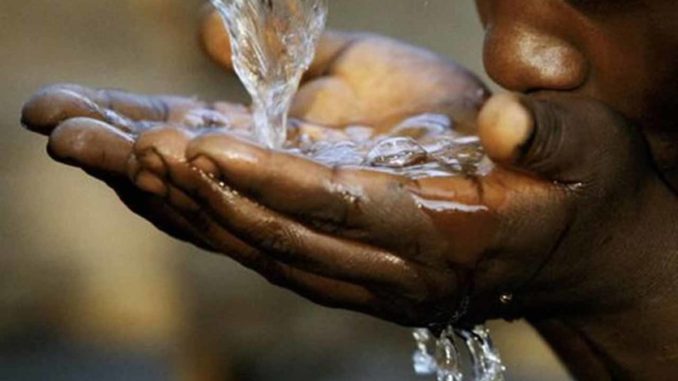
The seeming helplessness of state governments as citizens suffer acute water scarcity across the country is a shameful matter of serious concern. It calls to question policy thrusts on water and billions of naira the various state authorities have expended on water supply projects over the decades.
Nothing could justify a revelation that Nigerians at this stage would still be battling acute water scarcity. It is an indictment on the entire governance system in the country. The issue of potable water supply has been relegated by many states with dire consequences on the citizenry.
Reports from across the country show that residents are groaning over water scarcity. The situation is the same from Lagos to Sokoto and from Borno to River states. No state government has done anything to exit from this ignominious situation.
According to a recent survey report, in Katsina State, for instance, the state water board has been distributing water, using tankers in the metropolis. This is unsustainable. The rest of the residents rely on water vendors. A 25 gallons jerry can now costs N500 from N250. In Gombe, water scarcity is reportedly biting hard in the metropolis and its suburbs, forcing residents to rely on commercial water tankers. The state government is reported to be spending N994 million yearly to treat and discharge water to Gombe residents.
The situation is not different in Damaturu, Yobe State, where reports indicate that the collapse of the national grid has caused water scarcity, as most boreholes could not function. In Rivers State there is no functional public water system. Residents rely on boreholes while rural dwellers depend on streams and creeks. This is despite the reported inauguration of a water corporation committee by the state government last year.
The Bayelsa situation is precarious as most water sources are polluted. Residents rely on water vendors and the supply sources are clearly unreliable.
The foregoing captures the litany of lamentations, suffering and pain of the citizenry as a result of endemic water scarcity. The fear is that millions of Nigerians are daily exposed to deleterious water-borne diseases that debilitate and incapacitate them.
Not long ago, Vice President Yemi Osinbajo decried the high death rate of children from unsafe drinking water. He expressed his disgust in Abuja at the unveiling of the National Water Policies and launching of the Partnership for Expanded Water Supply, Sanitation and Hygiene (PEWASH), organised by the Federal Ministry of Water Resources. That ceremony and presidential lamentation has not improved water supply in the country.
Besides, President Muhammadu Buhari too the other day declared a state of emergency on water and sanitation, which is an admission that things are really bad in this sector and require urgent solution. The evidence is everywhere in every nook and cranny of the country. But the issue is not on verbal declaration of emergency but the actions taken to provide solution.
Although, the president directed government at all levels to redouble their efforts and work towards meeting the nation’s water supply and sanitation needs, there is nothing on ground to show compliance and no sense of urgency has been attached.
It needs to be reiterated that the provision of potable water supply, adequate sanitation and hygiene are primary responsibilities of state and local governments. Sadly enough, those who are supposed to serve the people have, over the years, failed woefully in their responsibility.
That common potable water, a basic necessity of life, is still lacking in 21st century Nigeria that has reaped stupendous wealth from oil since independence, is an indictment on the country’s leadership at all levels.
It is a matter of high regret that underscores the failure of governance. The people have been shortchanged just as the country is still many decades behind civilisation in this regard.
The issue of provision of potable water is one thing that has defied solution over the decades. People suffer preventable debilitating diseases as a result and millions are needed to treat such cases even as many have died.
Furthermore, it is regrettable from available data that access to piped water services, which was 32 per cent in 1990 declined to seven per cent in 2015, while access to improved sanitation also decreased from 38 per cent in 1990 to 29 per cent in 2015. It may have been worse now.
Since the 1970s, the country had developed a blueprint for national, state and even urban water supply schemes that were apparently abandoned, which explains why we are still in a water mess.
There was the national framework for achieving the UNICEF mandated International Drinking Water Supply and Sanitation decade (1981-1990), under which the issue of water supply and sanitation would have been addressed but it never happened.
Water was also one of the critical issues under the Millennium Development Goals (MDGs); unfortunately, Nigeria failed to actualise the national water supply objective under the programme.
All these simply show how the country has fumbled, having wasted all opportunities to tackle the water/sanitation problem.
It is instructive to note that epileptic power supply in the country is a major contributor to the water scarcity. Most water schemes need uninterrupted power supply to function. That being the case, it may take a while to solve the problem of water scarcity, as there is still unreliable power supply.
In the circumstances, there should be a clear-cut policy framework to guide action and funding, otherwise, nothing would be achieved. The states and local governments should be proactive in this regard.
Water is a public good. The federal government should not be acting as a lone ranger on this very important matter. The states should through the National Economic Council (NEC) chaired by the Vice President, be carried along at every stage to realise the critical objective of making water available to the people.
END

Be the first to comment